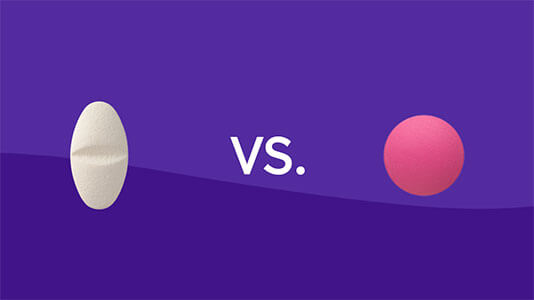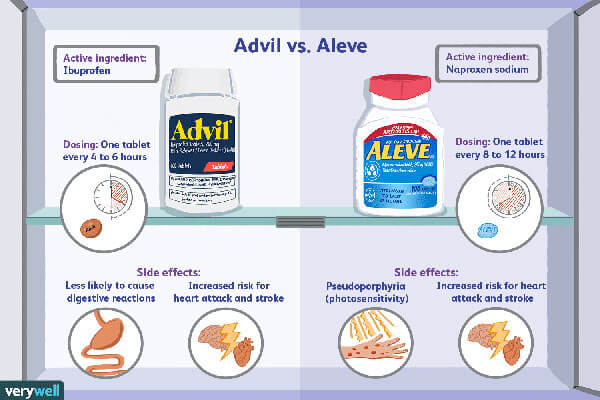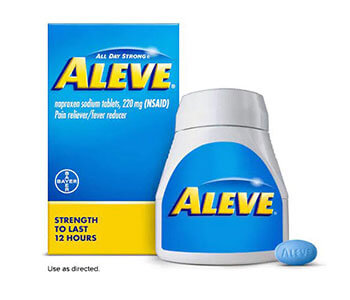Ibuprofen and naproxen are both common medications prescribed at St. Lawrence Dentistry. They have similarities, but subtle differences between them are essential to understand.
For example, ibuprofen is short-acting (4-6 hours), while naproxen is long-acting (8 to 12 hours) and more likely to generate an upset stomach. Ibuprofen and naproxen are NSAIDs, so they are akin in many ways, but there are meaningful differences.

Effectiveness of Naproxen and Ibuprofen
N aproxen and ibuprofen are “nonselective NSAIDs” because they block COX-2 enzymes (involved in inflammation and pain signaling) and COX-1 enzymes (associated with a protective effect on the stomach lining). It makes them effective at lessening pain and diminishing inflammation, but there is a chance of stomach-related side effects. Regarding efficacy, a dose of 440mg naproxen is about equivalent to 400mg ibuprofen.

Naproxen is Long-Acting, and Ibuprofen is Short-Acting
One of the most crucial distinctions is the length of time they act. Ibuprofen is deemed a short-acting NSAID with a somewhat quick onset of action. Therefore, it is better suited for treating acute pain and is the most appropriate NSAID for children. You must give ibuprofen tablets or capsules (such as Advil or Motrin) every four to six hours. Naproxen is considered long-acting and can be them twice daily for relief. It has a slow onset of effect and is better suited for addressing long-standing conditions.

Naproxen is More Likely to generate Gastrointestinal Side Effects since it is Long-Acting.
Investigations have uncovered that the risk of gastrointestinal (GI) side effects such as stomach ulcers and stomach bleeding grows the longer somebody takes NSAIDs. Naproxen is more likely (than ibuprofen) to induce GI side effects since it is longer acting. Therefore, you should take NSAIDs at their lowest effective dose for the shortest possible time. You should not take Ibuprofen and Naproxen together. If your doctor prescribed low-dose Aspirin to reduce your risk of a heart attack or stroke, talk to your physician before taking additional NSAIDs, as these may negate the defensive impacts of Aspirin.

NSAIDs elevate the chance Of Cardiac Side Effects.
Another concerning side effect of some NSAIDs is an elevated risk of cardiovascular events like a heart attack. As we know from many studies, Aspirin is protective against heart attacks. It prevents platelets from aggregating together, stopping serious clots from forming that can occlude a vessel and lead to a heart attack or stroke. The non-aspirin NSAIDs also work on that enzyme, affecting another enzyme that promotes clotting. Research has identified that those NSAIDs that tend to block COX-2 compared to COX-1 have an increased risk of thrombosis (blood clotting). There is no association between naproxen (at dosages up to 1000mg per day) and an increased risk of detrimental vascular events. Physicians like naproxen for this rationale. A small amount of (dosages up to 1200 milligrams per day) is an option for naproxen; however, there is a relationship between higher dosages of ibuprofen (up to the advised maximum of 2400mg/day) with an elevated risk of cardiovascular events. People who already have heart issues or have had a stroke must use NSAIDs carefully. Using NSAIDs after coronary artery bypass graft (CABG) surgery is not advisable. All NSAIDs carry a notification that they can elevate the risk of cardiovascular events, so you should only use them under a physician’s supervision, particularly in people with a history of heart disease. The risk of heart issues is minimal when a doctor prescribes for short periods – such as a musculoskeletal injury – in people at low cardiovascular risk.

Other Side Effects Common to all NSAIDs
There is an association between all NSAIDs and kidney toxicity and allergic-type reactions. NSAIDs also interact with medications, including:
- ACE inhibitors.
- Angiotensin-II receptor blockers.
- Diuretics.
- Asprin.
- Clopidogrel.
- Warfarin.
- Dabigatran.
In summary
Naproxen (up to 1000mg/day) or small-dose ibuprofen (up to 1200mg/day) is preferable if NSAIDs are deemed necessary in adults. At these dosages, the risk of cardiovascular events in people with no pre-existing risk factors is low, although the risk of GI side effects may be higher with naproxen.
We hope you have found this article informative. Thank you for reading it!
Reference:
https://www.drugs.com/medical-answers/naproxen-ibuprofen-difference-3117722/
https://www.healthgrades.com/right-care/symptoms-and-conditions/how-long-does-ibuprofen-stay-in-your-system
https://www.webmd.com/heart/news/20150710/fda-warning-nsaids-heart_risks
Disclaimer
This article is not medical advice. Please consult your doctor before making any decisions about medication.
- St. Lawrence Dentistry Looks Forward To St. Patrick’s Day! - March 12, 2025
- Understanding Dental X-Rays and Radiation: What You Should Know - January 13, 2025
- Happy New Year from St. Lawrence Dentistry! - December 30, 2024










